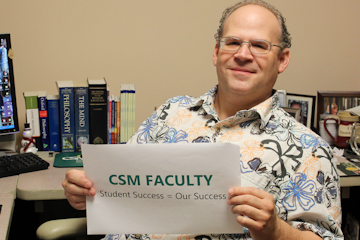From Dungeons and Dragons to Dave Chappelle, CSM Professor Applies Philosophical Theories to Gaming, Pop Culture

From Dungeons and Dragons to Dave Chappelle, CSM Professor Applies Philosophical Theories to Gaming, Pop Culture
 For many people, games offer a chance to take a break from the world – to play and relax. But for some players, gaming is a complex personal character-building exercise and even a philosophical activity, proposes College of Southern Maryland (CSM) Professor Dr. Richard Bilsker, pictured right.
For many people, games offer a chance to take a break from the world – to play and relax. But for some players, gaming is a complex personal character-building exercise and even a philosophical activity, proposes College of Southern Maryland (CSM) Professor Dr. Richard Bilsker, pictured right.
So strong is his believe, Bilsker will share his thoughts next month when he presents "Character Creation: Role-Playing Games and the Socially-Constructed Self” at the Popular Culture Association/American Culture Association virtual conference as part of a panel on role-playing games and philosophy.
Bilsker contends that creating a new character for a tabletop role-playing game is a fresh start and it creates an opportunity for players to imagine, and navigate a world, in a new way that affects their real-world selves.
“Thinking about how our game characters function in their worlds affects how we function in ours,” he wrote in his paper’s abstract.
“G. H. Mead, writing and lecturing at the turn of the last century, argued that our selves are socially constructed,” he explained. “Tabletop gaming, however it is done, is essentially a social activity—both for players and their characters. Neither the player nor the character comes to the table as a fully formed self.”
The conference will take place from April 13-16 and will feature presentations by scholars and enthusiasts who study popular culture, as well as an address from Art Spiegelman, author of the book “Maus,” which has recently been at the center of discussions about banning books in schools.
Bilsker has established himself as a strong voice in the philosophy and pop culture fields. He has published many articles in pop philosophy books, including a recent chapter in the book ‘Dave Chappelle and Philosophy: When Keeping It Wrong Gets Real’ from the Pop Culture Philosophy Series, published last year, that examined one of the comedian’s sketches from a philosophical perspective.
The article took apart a segment on the first episode of The Chappelle Show in which Chappelle played a blind black man who didn’t know he was black and became a white supremacist. Bilsker connected the skit to the view of the self in social philosophy, wherein a person and their meaning is created by the back and forth with society. Bilsker challenges readers to answer questions such as: How does someone create a self when that feedback is faulty? And how does humor help us examine this question?
He has also written on the X-Files and philosophy, based on an episode that dealt with bioethics; how Jimi Hendrix affected the philosophy of contract law; and the ways in which Mr. Rogers embodied the idea of ethics.
“I have started writing about popular culture both because it deeply interests me, and because these topics can be a gateway for readers to think more deeply about these fundamental questions. There are more interesting ways to interact with popular culture than merely passively consuming it,” Bilsker said.
He brings these notions into his classes, where he connects philosophy to students’ worlds by bridging philosophy to pop culture touchstones such as Seinfeld, The Simpsons, The Sopranos, and The Matrix.
“Studying Philosophy can be described as probing into the meaning of fundamental questions and exploring the answers to those questions,” Bilsker explained. “It's important for students to know that these questions have been pondered not just by academics or in classrooms, but rather that answers exist all around us.”
Bilsker has had a long time to challenge his students on these topics. He is in his 27th academic year at CSM, and over time he has taught or created every Philosophy course at CSM.
“Throughout the years I’ve had students take more than one class with me, especially when I teach across disciplines. Some of them have gone on to master’s programs and come back to tell me how thinking philosophically has helped them in their chosen path,” he said.
This spring, students can find Bilsker teaching Introduction to Logic and Cyber Ethics.
 my.CSMD
my.CSMD